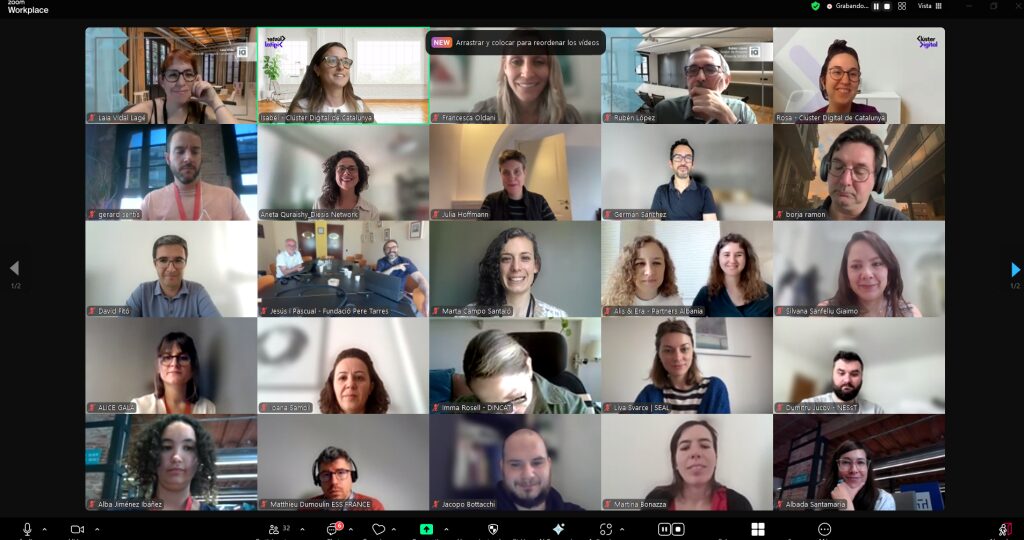
Blog author: Cluster Digital
On May 28, 2025, the second transnational workshop of the DO Impact project took place in Barcelona, co-organized by Clúster Digital de Catalunya and Taula d’entitats del Tercer Sector Social de Catalunya. The event brought together social economy enablers, digital innovation experts, and organizations to explore how open data can drive systemic change across the social sector. This workshop formed part of DO Impact’s broader capacity-building programme to support social economy actors in adopting digital and data-driven models.
The session opened with a joint presentation from Clúster Digital, outlining DO Impact’s mission: to strengthen the digital maturity of social economy entities by fostering the responsible use of data and AI. Taula del Tercer Sector also highlighted the specific context of Catalonia’s third sector, which encompasses over 3,000 organizations working for social inclusion, many of which still face challenges in accessing and leveraging data, and highlighted the common values and objectives througout Europe.
From Data Access to Strategic Action
One of the workshop’s core moments was the mentoring session by Germán Sánchez of AIS Group, who delivered an insightful, hands-on introduction to open data in the Social and Solidarity Economy (SSE). He outlined how organizations can use public datasets—from local to European levels—for smarter decision-making, impact assessment, policy advocacy, and more. Examples included:
- Open Data Manchester: using mobility data to improve child safety near schools.
- Healthsites (Netherlands): mapping access to healthcare in underserved regions.
- Community Energy projects in Spain: using household and energy data to reduce energy poverty.
Germán emphasized that SSE actors must not only use data, but also become active contributors, advocating for better indicators and producing their own open datasets.
A Call to Democratize Data
The keynote by Lourdes Muñoz, founder of Iniciativa Barcelona Open Data, was a strong call to democratize access to data tools, especially for social justice-focused organizations. She introduced the concept of data expeditions—collaborative journeys into data analysis—as a method to build skills and drive co-created solutions. Notable examples included:
Lourdes stressed the importance of building bridges between social and tech communities, highlighting tools like Google Looker Studio and Metabase as affordable, user-friendly entry points to data visualization.
Breakout Sessions: Practical Innovation in Action
Participants then joined thematic breakout sessions showcasing best practices from leading Catalan organizations:
- Health & Data – Sant Joan de Déu Hospital introduced their “Liquid Hospital” model, which uses real-time data and predictive algorithms to enhance patient care and reduce hospitalization of chronic patients, particularly children with rare diseases.
- Digitalization in Childhood Services – FEDAIA (Childhood and Adolescence Support Federation) presented the GEDISI initiative, a new digital system enabling standardized data collection across over 100 child welfare entities. The platform improves coordination, impact assessment, and advocacy for children’s rights.
- Job Placement & Social Innovation – Programa Làbora, a collaborative initiative between Barcelona City Council and NGO federations, shared how they use cloud-based dashboards and AI to monitor employment trajectories of vulnerable populations. Their data-driven approach has improved access to long-term jobs for over 60,000 individuals since 2015. – AMPANS Foundation presented their ENTIGEST program, a co-created digital platform developed with stakeholders to manage and evaluate support services for people with disabilities. The system has been adopted by over 30 organizations and is recognized for its positive impact on service quality and user autonomy.
Looking Ahead: Next Steps
The session concluded with an announcement of the third transnational workshop, set to take place in Riga on November 6–7, 2025, which will focus on data ethics and accessibility. Financial support will be available to enable the participation of grassroots social economy organizations.
